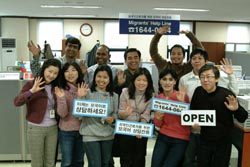Help Line 1644-0644 provides wider service for foreign workers
- Contents
-

What's the biggest frustration one is likely to face living in a foreign country? For 500,000 foreign workers living in Korea, the answer is simple -- the language barrier easily tops the list of various grievances and prejudice they face in the workplace.
To mark Migrant Workers' Day on Monday, the Korea Migrant Workers Center (http://www.migrantok.org/) will officially launch the Migrants Help Line: 1644-0644 on Thursday to provide counseling in various languages. The date also marks the second anniversary of the center's establishment.
Help Line operators will service calls in 12 different languages: Chinese, Mongolian, Thai, Vietnamese, Tagalog/English, Indonesian, Sri Lankan, Cambodian, Russian/ Uzbekistan, and Pakistan.
“That was the hardest part – to recruit language experts fluent in both Korean and second languages,” Lee Hyo-jeong head of the language division said.
What sets Help Line apart from the existing 1588 service is the new addition within the system. Call Back Service for example, makes sure to call you back when the line is busy or the call was made during off hours as long as you leave your number. The interpretation service provides free three-way service as well as a simultaneous translation service. A database has been set up for faster and systematic counseling.
Help Line has already received favorable reviews after three-months of trial service.
“The biggest merit of Help Line is the call-back service. In the past there was only one phone line so when I was in the middle of counseling one person, I couldn't get to another who called me later. Waiting is not an easy option because counseling can go anywhere from 10 minute to over an hour. But with this service, if people leave their numbers, we can always call back and reach more people in need,” said Odgerel in charge of the Mongolian service.
Kim Mi-hyun, in charge of Thai, also agreed. “Help Line is also great for Koreans who wish to communicate with foreign employees. For instance, a local employer needs to first give accurate instructions to new employees. When business is not going well, an employer can better explain the situation to the employees without leaving them worried too much about the delayed payment.”
Huong, providing Vietnamese service, said he likes the database. “Just a click and you have all kinds of information and files shown on the screen. It's easy to share unlike in the past when we had to check each other's information, flick through different file books and so on. It saves so much time.”
“Although our service is limited to regular office hours we plan to extend that to night hours as soon as we secure two or three times the number of interpreters we have now. If possible, we could also think of extending the variety of languages as well.” Kim Sang-hon, the center's director said.
“Korea is heading toward becoming the world's fastest ageing, low-birth society. The number of foreigners in Korea will continue to increase at the same time, and we have to establish a social system to harmonize with them. Providing language service comes as an important part to help people settle in Korea. We hope Help Line is the starting point of providing more diverse services to foreigners,” added Kim Hae-sung, a center representative.
-Help Line hours-
Weekdays: 9 a.m. – 6 p.m. (Lunch hour: 1 p.m. - 2 p.m.)
Weekends: 1 p.m. – 7 p.m.
Closed every Monday and holidays
-How to use Help Line-
Call 1644-0644, choose a language according to the numbered list.
-Languages by number-
1. Korean
2. Mongolian
3. Vietnamese
4. Chinese
5. Indonesian
6. Thai
7. Tagalog/English
8. Sri Lankan
9. Uzbekistan/ Russian
10. PakistanThe source of news : Korea.net December 21, 2006
